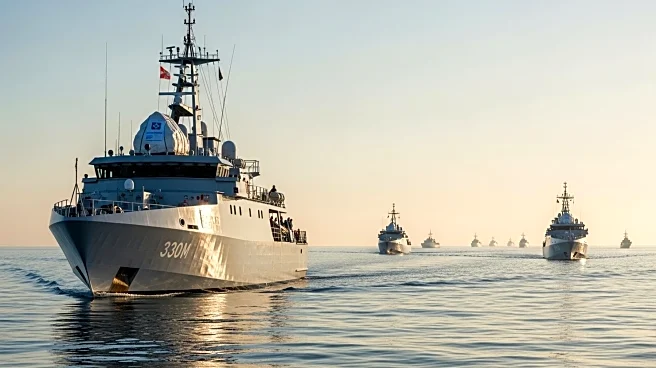What's Happening?
A flotilla of ships has set sail from Barcelona to the Gaza Strip, carrying humanitarian aid, activists, and celebrities. The initiative aims to break the Israeli blockade of the Palestinian territory, which has been in place for 18 years. The convoy, known as the Global Sumud Flotilla, includes approximately 20 boats and delegations from 44 countries. It is the largest attempt to date to deliver aid by sea to Gaza, where food experts have warned of famine conditions affecting half a million people. The flotilla is carrying essential supplies such as food, water, and medicine, and demands safe passage to deliver the aid and establish a humanitarian sea corridor. Thousands of supporters gathered at the Barcelona pier, chanting slogans in support of Palestine.
Why It's Important?
The departure of the flotilla highlights the ongoing humanitarian crisis in Gaza, exacerbated by the Israeli blockade and military actions. The blockade has severely restricted the flow of essential goods, contributing to widespread hunger and malnutrition. The involvement of high-profile activists and celebrities, such as Greta Thunberg and Susan Sarandon, draws international attention to the plight of Palestinians and the need for humanitarian intervention. The flotilla's mission underscores the broader geopolitical tensions in the region and the challenges faced by humanitarian efforts in conflict zones. Successful delivery of aid could alleviate some of the immediate suffering in Gaza and potentially influence international policy regarding the blockade.
What's Next?
The flotilla is expected to be joined by additional ships from Italy, Greece, and Tunisia as it progresses towards Gaza. Organizers anticipate potential confrontations with Israeli forces, which have previously intercepted aid ships. The international community may respond to the flotilla's efforts, potentially increasing diplomatic pressure on Israel to allow humanitarian aid into Gaza. The situation remains volatile, with the possibility of further military escalation in the region. Stakeholders, including governments and humanitarian organizations, will likely monitor the flotilla's progress and outcomes closely.
Beyond the Headlines
The flotilla's mission raises ethical questions about the responsibilities of nations and international bodies in addressing humanitarian crises. It also highlights the role of civil society and grassroots movements in advocating for human rights and challenging governmental policies. The involvement of celebrities and activists in such initiatives can amplify marginalized voices and bring attention to complex geopolitical issues. Long-term implications may include shifts in public opinion and policy changes regarding humanitarian access and conflict resolution in the region.









